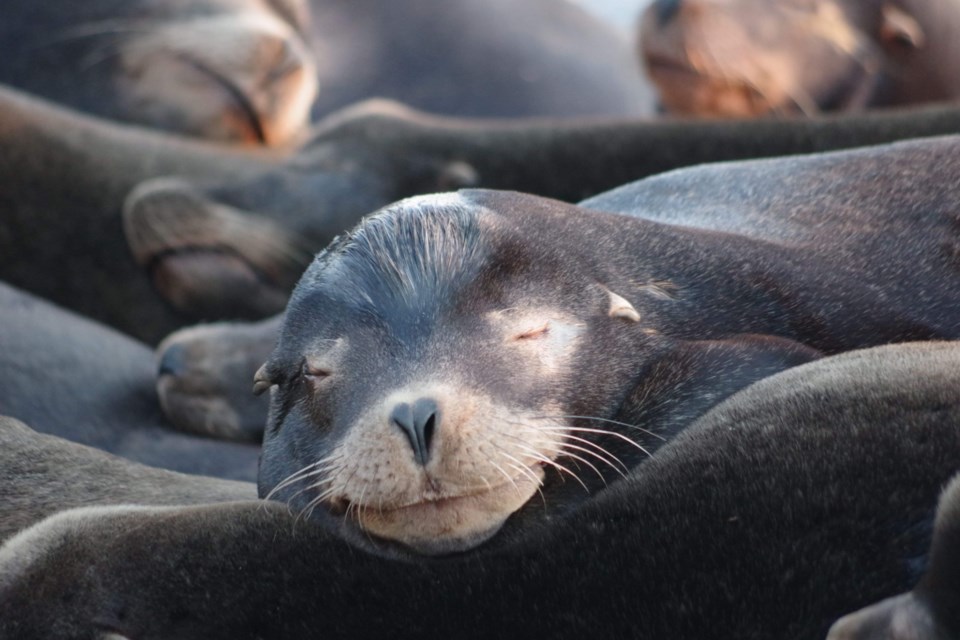Anglican priest, naturalist and author Laurel Dykstra wrote Wildlife Congregations: A Priest's Year of Gaggles, Colonies and Murders by the Salish Sea after spending time observing nature in a variety of places such as the lower Fraser watershed and the qathet region.
Dykstra explained that the organizational design of the book is meant to be like a guide and also reminiscent of the Aberdeen Bestiary, a 12th century catalogue of animal species once owned by King Henry VIII. Some of Dykstra's most memorable jaunts into nature include spending time near hundreds of giant, basking California sea lions congregating on the breakwater in Townsite in 2019.
"Being outdoors, being in nature, connection with wild creatures, has been like a source of spiritual connections for me," said Dykstra. "That, coupled with a sense of urgency around the climate crisis and how faith communities might respond."
Dykstra has been an Anglican reverend and priest in the Lower Mainland and North Vancouver for more than a decade and is the founder of Salal + Cedar, a church in the diocese that prays outdoors and has a vocation for ecological justice.
"The idea being that you practice your discipleship and practice your faith in a particular location, and if you don't have relationships with the creatures and the waterways, the landforms, the plants of that place, then you don't really love your neighbours," said Dykstra. "If you don't know them [animals and the natural world] in a relational way, then you are not motivated to protect something in the abstract."
Dykstra's work in the faith community and the approach to writing the book emphasizes the importance of growing a deeper connection with nature, born out of understanding that humans are a part of that relationship with the ecological world.
"The [book’s] intention is to share the enthusiasm, interest in the world around you," added Dykstra.
One of the first chapters starts in February 2019, when Dykstra’s daughter came on the qathet visit to witness the sea lions that migrate to the area in the winter.
"All the way up I was worried we would miss them, that these thousands of sea lions were going to slip into the ocean and undulate away through the waves," said Dykstra. “[I was thinking] they're not going to be there when I get there, but that did not happen."
At that time, Dykstra wasn’t planning to write a book yet, but seeing the sea lions may have planted the seed.
Each chapter recounts different encounters within nature, along with humour and observational musings. Often Dykstra would return to an area over a period of time, in order to observe, for example, salmon spawning or a toad migration. But not all of Dykstra's nature encounters were in the wilderness.
"There is the crow migration that happens every evening in Vancouver and the primary watching spot is a Costco parking lot," said Dykstra. "There's a heron rookery in Stanley Park and the largest maternal bat colony in British Columbia is on Deas Island."
Many migrations, spawning and animal movements happen in short periods of time, according to Dykstra.
"There are thousands of bats there [Deas Island] and they emerge in a huge number in a small window of time," said Dykstra. "Similar to the toad migration, it happens only for a few days in the summer."
The bat colony lives in an old historic house that was relocated to the island many years ago.
"They don't actually take up that much space and they don't disrupt people living in the house," said Dykstra.
The index and glossary of the book includes definitions and words, along with informational tidbits about each creature encountered.
Each month in the book is a chapter about a particular group of animals. For example, February is when Dykstra encountered the sea lions, and August was the toad migration.
"We're a creature that's evolved alongside all kinds of [animal] companions, but our contact with them is more and more limited," said Dykstra. "Here we are, in this age of mass extinction, and so whatever happens to humans, and whatever/whomever else we take out with us on our exit, that life is going to continue."
Dykstra had a sense of, "we don't matter so much, but life does matter and continues to matter,” and recalls spending time close to hundreds of massive sea lions in qathet.
“Being around this massive, teeming life force and beside it, you feel pretty insignificant, and can take comfort that life [in the natural world] is going to continue,” said Dykstra.
On Saturday, September 21, Dykstra will present a hands-on nature show-and-tell of the new book at Powell River Public Library.
Join the Peak’s email list for the top headlines right in your inbox Monday to Friday.



